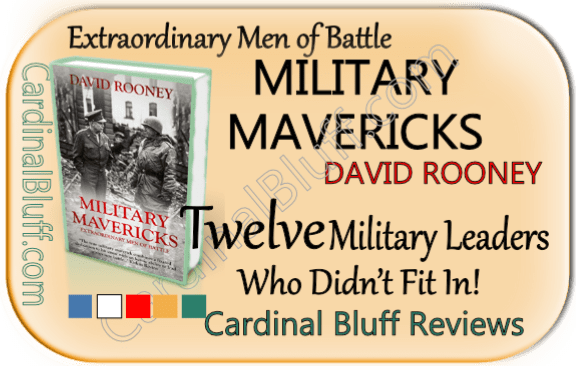The strong men of battle in Military Mavericks fought beyond their flaws to meet their goals. At times split-second decisions turned a battle from defeat to victory. More than once the maverick leader grabbed his weapon and charged. His troops followed him to the victory.

Rooney writes biographical sketches of twelve men on all sides of the wars featured. Each man had qualities that made him an unorthodox military leader. Politics were seldom at the forefront of his goals.
Mix Fear and Recklessness to Get Brave Guts
That recipe will become condensed bios of twelve guys who were leaders in the blood, dirt, and death of battle.
Alexander the Great starts this list of leaders who didn’t fit the regimentation mold. He conquered with war and politics, recruiting small leaders from the defeated cultures. His troops traveled all over the place afoot or on horseback. There was no 21 Century technology. Or running water.
In some instances, they used captured elephants for intimidating transportation. When Alexander’s soldiers face the elephants in battle, they used vicious and destructive. tactics toward the huge animals

Orde Wingate and the Chindits were outstanding on the concept of guerrilla warfare. They operated against the Japanese in the Pacific of World War II. The Chindit actions were effective against the Japanese.
Their own commanders and colleagues were a different enemy. People in command who didn’t ‘get’ the commando battle concepts betrayed them. They were left on their own, trapped. Disrespectful colleagues ruined Orde Wingate’s military career and hope.
Otto Skorzeny didn’t experience such great career destruction. He led a pack of commandos called The Hunting Group. His plans became highly successful in Nazi SS operations.
Yet, his operations and plans were often screwed up by interference from higher officers and party leaders. That interference was a common thread throughout the leader bios.
After the war, Skorzeny had a ‘retirement’ career working with Middle East intelligence. Rooney attributes anti-Communist and anti-Semitic passions to Skorzeny. Those opinions aren’t consistent with reports of his intelligence service with Mozad.
Strong men of battle hear Different Drummers
What makes the ‘mavericks’ tick? To a man, the mavericks seemed to understand different approaches to battle. Or recognize and take advantage of enemy weakness. Because of their observance, desisions were often more studied than impulsive. Yet, if necessary, they weren’t afraid to make an impulsive decision.
How about the failures?Failure destroyed a few of these leaders. But their colleagues were often their greatest challenge and destruction.
Things went wrong and the only piece leading to victory was the ‘maverick’ leader himself. Luck is a dangerous word to use when lives are at stake, but sometimes that is all there was between a win or drastic loss.
Personality and Competition Interfere with Victory
Rooney is impartial in his opinions and information about the selected Military Mavericks. He is strongly opinionated in his analysis of their activities. Often supportive of the leader, he also acknowledges foibles that contributed to troubles. He chose active, successful leaders who were not always likable.
The men in the short biographies were not conventional. More often they were gently rogue and didn’t follow the playbook. Some, such as Orde Wingate, made connections with people who were higher up the command ladder. Of course, these tactics didn’t make him more popular. The ‘mavericks’ were rule-breakers and risk-takers all around.
Troops were generally loyal and supportive of their leader. When he was at the head of a charge, they were with him all the way. Memoirs written by enemy soldiers acknowledged the mavericks. They have credited the leadership with the win.

Competition and disrespect from other officers made big problems.. Sometimes those critics just didn’t see the big picture. Sometimes they were just stubborn. They argued, delayed and resisted. Competitive, critical attitudes and plots destroyed the careers of more than one maverick leader.
Rooney didn’t try to hide the personal odd ticks of each leader. These little things helped make them who they were. These men were all ‘different.’ And they didn’t care! Outspoken behavior often got them crosswise with commanders and the public. Careless comments and action against orders cost a few men their careers. In those times, they weren’t ‘pushed under a bus’, they crawled under on their own.
Military Mavericks – There’s Plenty to Like
Military Mavericks is non-fiction. Written with the author’s research, there may be differences of opinion and perception. As a non-thriller, sometimes I had to ‘slog’ through the pages. All of the men featured deserve to be acknowledged. Any slow reading was because the man wasn’t specifically in my interest sites. The writing kept me coming back for more when the man’s narrative became dry and boring. I really like to read military logistics, play by play, so I could happily slog through as noted in the September Diary for Cardinal Bluff.
I enjoy military history. There were some leaders in the book whom I knew about. A few others were people new to me. Rooney’s voice is pleasantly objective, but he makes his opinions clear. This characteristic makes his writing believable.
Rooney has written other historical books. This is the first I have read. He managed to tell me a story with detail that wasn’t boring. It was not intended to be a thriller and could be a slow read. You can learn more about the books written by David Rooney at his Amazon author page.
Lessons Beyond Military
These misfit leaders were often ‘thinking beyond the box.’ I like that sort of thinking in life and business. One has to be aware of several facets of your situation. When you map out the ‘what-ifs’, a likelihood pattern comes up. Pay attention to the things going on around you. Listen to what people are saying. Sometimes the most articulate are really saying NOTHING.
Military Mavericks is a book I will be happy to keep in my collections. I’m glad I read this book and learned about each of these leaders. Their admirable persistence teaches readers. Some had sad endings and never had their passions fulfilled.



